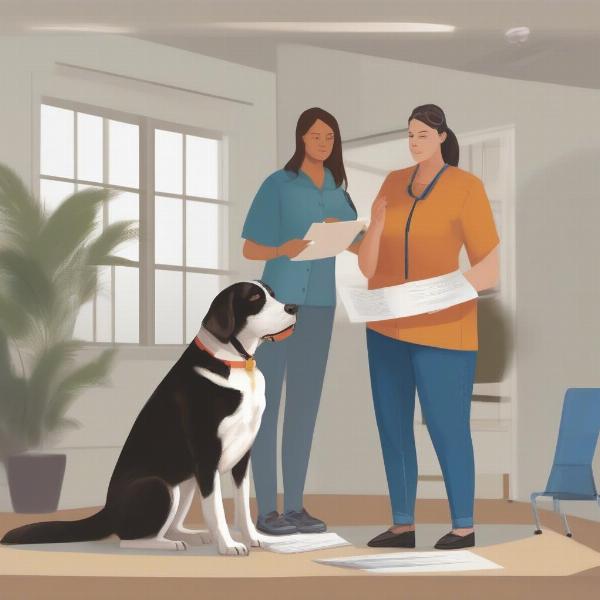Understanding the rules and regulations surrounding service dogs and housing can be confusing. Many tenants wonder, “Can a landlord require documentation for a service dog?” The short answer is: it’s complicated. While landlords can’t ask for proof of a disability, they can request documentation related to the dog’s training and behavior, especially if it poses a direct threat to others. This article will delve into the intricacies of service dog documentation, your rights as a tenant with a service dog, and how to navigate potential challenges with your landlord.
Landlords are obligated to make reasonable accommodations for individuals with disabilities, which includes allowing service dogs in typically “no-pet” housing. This is protected under the Fair Housing Act (FHA) in the United States. However, the FHA also recognizes a landlord’s right to maintain a safe and peaceful environment for all residents. This is where the nuance of service dog documentation comes into play. Landlords cannot outright deny a service dog based on breed or perceived disability, but they can inquire about the dog’s training and behavior to ensure it won’t disrupt the community.
Understanding Reasonable Accommodation Requests
The core of the issue lies in understanding “reasonable accommodation.” Allowing a service dog, even if there’s a “no-pet” policy, is generally considered a reasonable accommodation. However, if the dog exhibits aggressive behavior or causes significant damage, the landlord might have grounds to deny the request or take further action.
 Landlord and tenant discussing service dog accommodation.
Landlord and tenant discussing service dog accommodation.
This is where providing documentation can be beneficial. While you’re not required to disclose your disability or provide proof of your need for the service dog, offering documentation showcasing the dog’s training, especially from a reputable organization, can reassure the landlord and facilitate a smoother process. For instance, a letter from a certified dog trainer detailing the dog’s abilities and temperament can be incredibly helpful. This proactive approach can help avoid misunderstandings and potential disputes.
What Documentation Can a Landlord Legally Request?
A landlord cannot ask for your medical records or a doctor’s note confirming your disability. However, they can request documentation pertaining to the dog’s training, behavior, and health. This might include:
- Proof of training: Documentation from a professional trainer outlining the dog’s specific tasks and skills related to mitigating your disability. service dog letter
- Vaccination records: Up-to-date vaccination records are essential to ensure the health and safety of all residents.
- License and registration (if required by local laws): Providing proof of licensing demonstrates responsible pet ownership.
- Liability insurance: Some landlords might request proof of liability insurance to cover any potential damages caused by the dog.
Navigating Challenging Situations
Unfortunately, some landlords might be unfamiliar with the laws surrounding service dogs. If you encounter resistance, providing clear and concise information about your rights under the FHA can be helpful. You can also refer your landlord to the HUD website for further clarification. Remember, a service dog is not a pet; it’s a necessary tool that enables you to live independently.
What if My Landlord Still Refuses?
If your landlord continues to refuse accommodation despite providing reasonable documentation, you have several options:
- Contact a local fair housing agency: These agencies can provide mediation services and investigate potential discrimination.
- Consult with a disability rights organization: These organizations can offer legal advice and support.
- Consider legal action: As a last resort, you might consider filing a complaint with the Department of Housing and Urban Development (HUD) or pursuing a lawsuit.
Proactive Steps for a Smooth Transition
To proactively address potential issues, consider these steps:
- Inform your landlord in writing: Send a formal letter requesting reasonable accommodation for your service dog. service dog letter for housing
- Provide relevant documentation upfront: Offer proof of training and vaccination records proactively. psychiatric service dog letter
- Maintain open communication: Keep your landlord informed about any concerns or issues related to your service dog.
Conclusion
While landlords cannot demand proof of your disability, they can request reasonable documentation regarding your service dog’s training and behavior. Being prepared with this documentation can streamline the process and avoid unnecessary conflict. Understanding your rights and responsibilities under the FHA is crucial for navigating the complexities of renting with a service dog. By proactively addressing potential issues and maintaining open communication, you can ensure a positive and successful living arrangement for both you and your service dog.
FAQ
- Can a landlord charge a pet deposit for a service dog? No, landlords cannot charge pet deposits or fees for service dogs.
- Can a landlord deny a service dog based on breed restrictions? No, breed restrictions do not apply to service dogs.
- What if my service dog causes damage to the property? You are responsible for any damages caused by your service dog.
- Can a landlord ask about my disability? No, landlords are not allowed to inquire about the specifics of your disability.
- What if my landlord says my dog is too big? Size restrictions generally do not apply to service dogs if the dog is necessary for your disability.
- Can a landlord require my service dog to wear a vest at all times? No, while a vest can be helpful, it’s not legally required.
- Do I need to register my service dog? Registration requirements vary by state and local laws. register dog as emotional support dog esa dog tag
ILM Dog is a leading international website dedicated to providing expert advice on dog care and breeding. From choosing the right breed to understanding the nuances of service dog laws, we offer comprehensive resources for dog owners worldwide. Whether you’re a seasoned dog owner or just starting your journey, ILM Dog is your go-to resource for all things canine. Contact us for expert advice: Email: [email protected], Phone: +44 20-3965-8624.